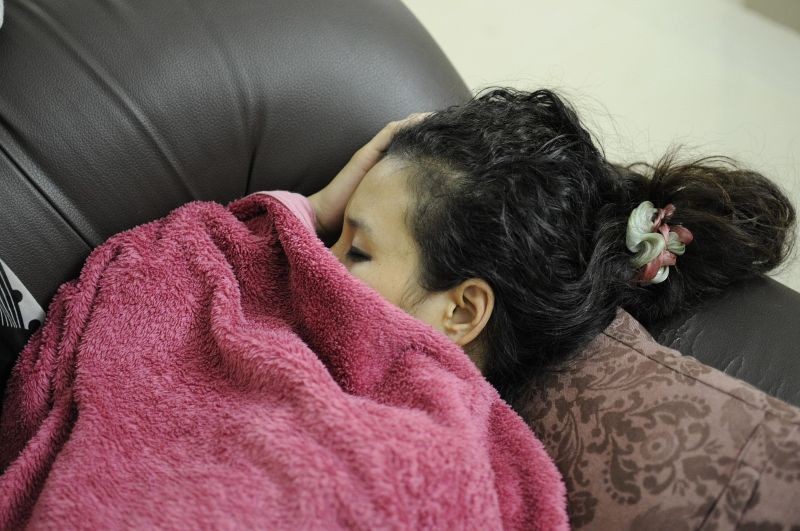 Heart Problem
Heart Problem
Even few nights of insufficient sleep can affect heart problems, shows study
Even a few nights with insufficient sleep promote molecular mechanisms linked to a greater risk of heart problems, a new study has revealed.
Researchers participating in the study investigated how sleep deprivation affects biomarkers (in this case proteins) associated with cardiovascular disease.
The study was led from Uppsala University and is published in the journal Biomarker Research.
“Unfortunately, nearly half of all Swedes regularly experience disturbed sleep, and this is particularly common among shift workers. That is why we wanted to try to identify mechanisms that affect how lack of sleep can increase the risk of cardiovascular disease. Ultimately, the purpose was to identify opportunities to address these problems,” says Jonathan Cedernaes, physician and docent at Uppsala University, who led the study.
A chronic lack of sleep is a growing public health problem and in large population studies it has been linked to an increased risk of heart attack, stroke and atrial fibrillation, reads the Uppsala University website.
Heart health is influenced by several lifestyle factors, including sleep, diet and exercise.
In order to separate out the effects of sleep, a number of conditions were controlled in the laboratory environment such as diet and physical activity.
How the study was conducted
The authors studied 16 healthy young men of normal weight. They all had healthy sleep habits.
The participants spent time in a sleep laboratory where their meals and activity levels were strictly controlled in two sessions.
In one session, participants got a normal amount of sleep for three consecutive nights, while during the other session, they got only about four hours of sleep each night.
During both sessions, morning and evening blood samples were taken, and following high-intensity exercise lasting 30 minutes.
Inflammatory proteins increased after sleep loss
The researchers measured the levels of around 90 proteins in the blood and were able to see that the levels of many of these that are associated with increased inflammation rose when the participants were sleep-deprived.
Many of these proteins have already been linked to an increased risk of cardiovascular disease such as heart failure and coronary artery disease.
“Many of the larger studies that have been done on the link between sleep deprivation and the risk of cardiovascular diseases have generally focused on slightly older individuals who already have an increased risk of such diseases. That is why it was interesting that the levels of these proteins increased in the same way in younger and previously perfectly healthy individuals after only a few nights of sleep deprivation. This means that it’s important to emphasise the importance of sleep for cardiovascular health even early in life,” says Jonathan Cedernaes.
The effects of exercise can be affected by lack of sleep
Physical exercise generated a slightly different response after lack of sleep.
However, a number of key proteins increased equally, whether the person was sleep-deprived or not.
Thus, proteins that can be linked to the positive effects of exercise increased, even if the person had too little sleep.
The researchers have previously shown that exercise in the presence of sleep deprivation can result in a slightly increased load on the heart’s muscle cells.
“With this study, we have improved our understanding of what role the amount of sleep we get plays in cardiovascular health. It’s important to point out that studies have also shown that physical exercise can offset at least some of the negative effects that poor sleep can cause. But it's also important to note that exercise cannot replace the essential functions of sleep,” says Jonathan Cedernaes.
Hopefully help to develop better guidelines
“Further research is needed to investigate how these effects might differ in women, older individuals, patients with heart disease, or those with different sleep patterns. Our ongoing research will hopefully help to develop better guidelines on how sleep, exercise and other lifestyle factors can be harnessed to better prevent cardiovascular diseases,” says Jonathan Cedernaes.
The study was carried out in collaboration with researchers at Akershus University Hospital and Sahlgrenska University Hospital, and was supported by the Swedish Society for Medical Research (SSMF), the Göran Gustafsson Foundation, the Swedish Diabetes Foundation, and Hjärnfonden (the Swedish Brain Foundation).
Support Our Journalism
We cannot do without you.. your contribution supports unbiased journalism
IBNS is not driven by any ism- not wokeism, not racism, not skewed secularism, not hyper right-wing or left liberal ideals, nor by any hardline religious beliefs or hyper nationalism. We want to serve you good old objective news, as they are. We do not judge or preach. We let people decide for themselves. We only try to present factual and well-sourced news.







